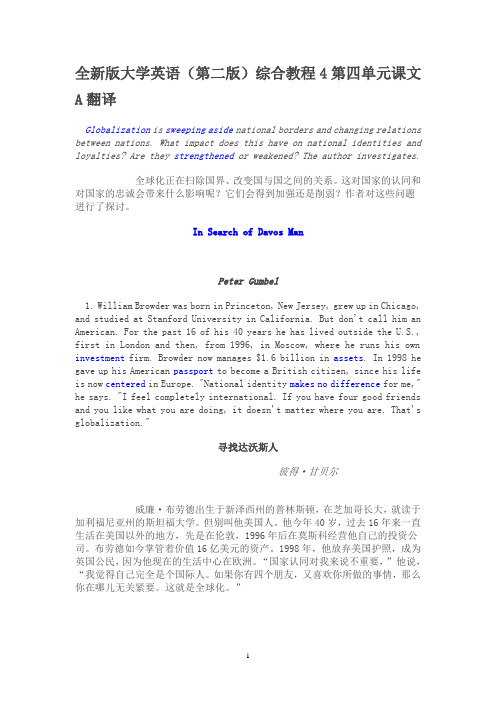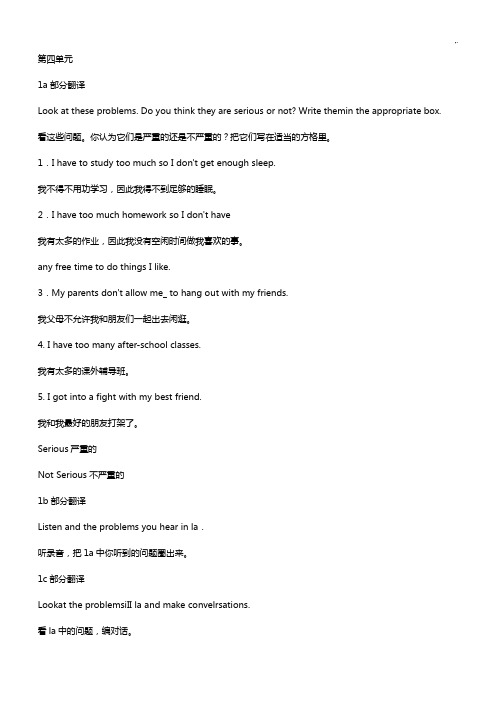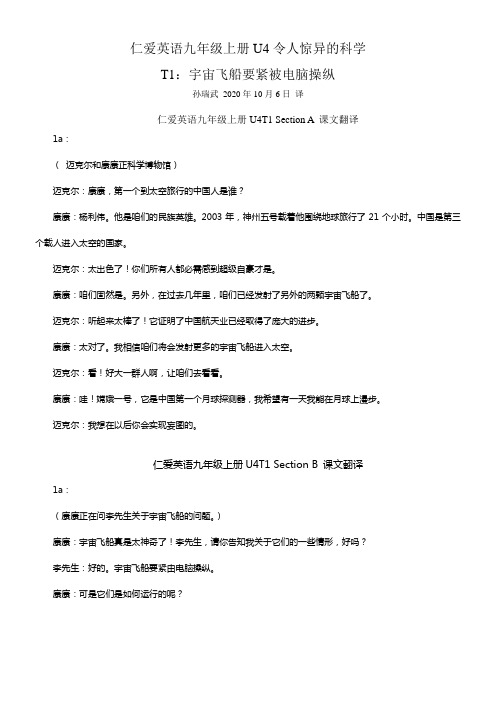第四单元课文翻译知识讲解
九年级英语第四单元3a课文翻译和知识点

九年级英语第四单元3a课文翻译和知识点Unit 4, Lesson 3a - Translation and Key Points from the Ninth Grade English TextbookIn this article, we will delve into the translation and key points from the fourth unit, 3a lesson of the ninth-grade English textbook. The aim is to provide a comprehensive understanding of the lesson while avoiding monotonous content and structure.I. Lesson OverviewThe 3a lesson centers around cultural experiences, specifically, visiting homes in different countries. Through this lesson, students are exposed to diverse cultures, traditions, and ways of life. The main character, Alan, visits his pen pal, Liu Wei, in China. The dialogue unfolds as Liu Wei, a Chinese student, introduces Alan to his family, home, and various Chinese customs.II. Cultural ExplorationThe lesson allows students to explore the cultural backgrounds of different countries. By focusing on China, students gain insights into the traditions and customs followed by Chinese families. Through LiuWei's invitation to Alan, students learn about Chinese hospitality, greetings, and the significance of sharing food during meals.III. Translation ExercisesProviding translation exercises helps students grasp the meaning of words and phrases in both English and Chinese. In this lesson, students can practice translating sentences from the text to enhance their language skills. For example, "Welcome to my home" can be translated as "欢迎来我家."IV. Vocabulary ExpansionExpanding vocabulary is crucial in learning any language. This section of the lesson focuses on introducing new words such as "pen pal," "tradition," and "experience." By encouraging students to use these words in their writing and speaking activities, they can improve their English proficiency.V. Grammar PointsGrammar forms the foundation of language learning. In this lesson, the grammar points revolve around the use of modal verbs such as "can" and "could." Students practice using these modal verbs correctlyin sentences, allowing them to gain a better understanding of their functions and applications.VI. Listening and Speaking ActivitiesTo enhance listening and speaking skills, the lesson incorporates activities where students can practice conversations with their classmates. Through role-playing exercises, students simulate forming introductions and exchanging cultural information. This approach improves students' ability to communicate and interact effectively in English.VII. Reading ComprehensionReading comprehension exercises support students in developing a deeper understanding of the lesson's text. By answering questions related to the passage, students can demonstrate their comprehension and analytical abilities. This also assists in consolidating newly acquired vocabulary and grammar knowledge.VIII. Writing PracticeThe writing component of this lesson encourages students to describe their own homes and customs. By incorporating personal experiences, students develop both creativity and language skills. Italso provides an opportunity for self-expression and cultural exchange within the class.IX. ConclusionThe 3a lesson of the ninth-grade English textbook offers an immersive experience into cultural differences and global understanding. Through translation exercises, vocabulary expansion, grammar points, listening and speaking activities, reading comprehension exercises, and writing practice, students are exposed to a holistic language learning experience. By exploring other cultures, students broaden their horizons and become more compassionate global citizens.。
第四单元课文翻译

全新版大学英语(第二版)综合教程4第四单元课文A翻译Globalization is sweeping aside national borders and changing relations between nations. What impact does this have on national identities and loyalties? Are they strengthened or weakened? The author investigates.全球化正在扫除国界、改变国与国之间的关系。
这对国家的认同和对国家的忠诚会带来什么影响呢?它们会得到加强还是削弱?作者对这些问题进行了探讨。
In Search of Davos ManPeter Gumbel1. William Browder was born in Princeton, New Jersey, grew up in Chicago, and studied at Stanford University in California. But don't call him an American. For the past 16 of his 40 years he has lived outside the U.S., first in London and then, from 1996, in Moscow, where he runs his own investment firm. Browder now manages $1.6 billion in assets. In 1998 he gave up his American passport to become a British citizen, since his life is now centered in Europe. "National identity makes no difference for me," he says. "I feel completely international. If you have four good friends and you like what you are doing, it doesn't matter where you are. That's globalization."寻找达沃斯人彼得·甘贝尔威廉·布劳德出生于新泽西州的普林斯顿,在芝加哥长大,就读于加利福尼亚州的斯坦福大学。
八下英语第四单元课本学习知识翻译

第四单元1a部分翻译Look at these problems. Do you think they are serious or not? Write themin the appropriate box. 看这些问题。
你认为它们是严重的还是不严重的?把它们写在适当的方格里。
1.I have to study too much so I don't get enough sleep.我不得不用功学习,因此我得不到足够的睡眠。
2.I have too much homework so I don't have我有太多的作业,因此我没有空闲时间做我喜欢的事。
any free time to do things I like.3.My parents don't allow me_ to hang out with my friends.我父母不允许我和朋友们一起出去闲逛。
4. I have too many after-school classes.我有太多的课外辅导班。
5. I got into a fight with my best friend.我和我最好的朋友打架了。
Serious严重的Not Serious不严重的1b部分翻译Listen and the problems you hear in la.听录音,把1a中你听到的问题圈出来。
1c部分翻译Lookat the problemsiII la and make convelrsations.看la中的问题,编对话。
A:What's wrong?怎么了?B:I'm reafly tired because I studied until midnight last night.我真的很累,因为我昨晚学习到半夜。
A:Why don't you go to sleep earlier this evening?为什么今晚你不早点儿去睡呢?2a部分翻译Listen.Peter's friend is gjving him advice. Fill in the blanks with could or should.听录音。
仁爱英语九年级上册第四单元第一话题课文翻译

仁爱英语九年级上册U4令人惊异的科学T1:宇宙飞船要紧被电脑操纵孙瑞武2020年10月6日译仁爱英语九年级上册U4T1 Section A 课文翻译1a:(迈克尔和康康正科学博物馆)迈克尔:康康,第一个到太空旅行的中国人是谁?康康:杨利伟。
他是咱们的民族英雄。
2003年,神州五号载着他围绕地球旅行了21个小时。
中国是第三个载人进入太空的国家。
迈克尔:太出色了!你们所有人都必需感到超级自豪才是。
康康:咱们固然是。
另外,在过去几年里,咱们已经发射了另外的两颗宇宙飞船了。
迈克尔:听起来太棒了!它证明了中国航天业已经取得了庞大的进步。
康康:太对了。
我相信咱们将会发射更多的宇宙飞船进入太空。
迈克尔:看!好大一群人啊,让咱们去看看。
康康:哇!嫦娥一号,它是中国第一个月球探测器,我希望有一天我能在月球上漫步。
迈克尔:我想在以后你会实现妄图的。
仁爱英语九年级上册U4T1 Section B 课文翻译1a:(康康正在问李先生关于宇宙飞船的问题。
)康康:宇宙飞船真是太神奇了!李先生,请你告知我关于它们的一些情形,好吗?李先生:好的。
宇宙飞船要紧由电脑操纵。
康康:可是它们是如何运行的呢?李先生:宇航员用电脑操纵宇宙飞船的速度和方向,乃至是温度。
康康:太令人惊异了!可是我仅仅明白一点电脑技术的知识。
李先生:把握电脑技术知识是超级重要的,因此我建议你要尽力学习,把握电脑知识来更好地为咱们效劳。
康康:我也如此以为。
谢谢你的介绍,李先生。
仁爱英语九年级上册U4T1 Section C 课文翻译1a:电脑已经在工作领域上和业余时刻里都变得超级重要。
毫无疑问,电脑在技术和商业领域中很有利用价值。
在太空,电脑帮忙宇航员操纵宇宙飞船的速度和方向。
在电脑的帮忙下,医生们更易能发觉疾病,解决其他问题。
例如,把微小的电脑放进病人的躯体能够帮忙病人心脏正常跳动。
在工厂里,由电脑操纵的机械人能够为人们去做那些危险的工作。
在商业领域上,电脑被利用于订购或取消定单。
人教版高中英语必修四课文翻译

人教版高中英语必修四课文翻译第一单元:非洲野生动物研究者清晨 5 点 45 分,太阳刚从东非的贡贝国家公园的上空升起,我们一行人准备按照简研究黑猩猩的方法去森林里拜访它们。
简研究这些黑猩猩家族已经很多年了,她帮助人们了解黑猩猩跟人类的行为是多么的相似。
我们当天的首项任务就是观察黑猩猩一家是如何醒来的。
这意味着我们要返回前一天晚上我们离开黑猩猩一家睡觉的大树旁。
大家坐在树荫下等待着,这时候猩猩们睡醒了,准备离开。
然后这群黑猩猩向森林深处漫步而去,我们尾随其后。
在大部分时间里,黑猩猩或相互喂食,或彼此擦身,这在它们的家庭里是表示爱的方式。
简预先提醒我们,到下午的时候我们就会又脏又累。
她说对了。
不过到傍晚时分我们觉得这一切都是值得的。
我们看到黑猩猩妈妈跟她的幼子们在树上玩耍,后来看见它们晚上一切回窝里睡觉了。
我明白了猩猩家庭成员之间的联系像人类家庭一样紧密。
在简之前没有人完全了解黑猩猩的行为。
她花了多年的时间来观察并记录黑猩猩的日常生活。
从孩提时代起,简就想在动物生活的环境中研究它们。
但是,这不是一件简单的事。
当她1960 年最初来到贡贝时,对女性来说,住进大森林还是很稀罕的事情。
她母亲头几个月来帮过她的忙,这才使她得以开始自己的计划。
她的工作改变了人们对黑猩猩的看法。
比方说,她的一个重要发现是黑猩猩猎食动物。
而在此之前,人们一直认为黑猩猩只吃水果和坚果。
她曾经亲眼看到过一群黑猩猩捕杀一只猴子,然后把它吃掉。
她还发现了黑猩猩之间是如何交流的,而她对黑猩猩肢体语言的研究帮助她勾勒出黑猩猩的社会体系。
40年来,简古道尔一直在呼吁世人了解并尊重这些动物的生活。
她主张应该让野生动物留在野外生活,而不能用于娱乐或广告。
她还为黑猩猩建起了可以安全生活的保护区。
她的生活是忙忙碌碌的,然而,正如她所说的:“我一旦停下来,所有的一切都会涌上心头。
我就会想起实验室的黑猩猩,太可怕了。
每当我看着野生黑猩猩时,这个念头总是萦绕着我。
pep四年级英语下册第四单元课文原文和翻译

pep四年级英语下册第四单元课文原文和翻译pep四年级英语下册第四单元课文原文和翻译36面Unit 4 At the Farm 农场36面36面How many horses do youhave?你有多少匹马?36面Seventeen. 十七。
36面What are these? 这些是什么?36面Are these potatoes? 是土豆吗?36面Let me try one... 我试一个……36面They're carrots. 它们是胡萝卜。
37面What are those? 那些是什么?37面They're sheep. 是羊。
37面Let me count... 我数数……1 / 2837面Oh, I feel sleepy. 哦,我困了。
38面Unit 4 A Let's talk 一起说吧38面38面Look at these! 看这些!38面Are these carrots? 这些是胡萝卜吗?38面Yes, they are. 是的。
38面Wow! They're so big! 哇!好大!38面What are these? 这些是什么?38面They're tomatoes. 是西红柿。
38面But they are yellow. 但是它们是黄色的。
38面Try some! They're good. 尝尝看!它们很好。
38面Thanks. Yum. 谢谢。
很美味。
2 / 2838面38面38面Let's play38面What are these?38面Are they potatoes?38面No.38面38面Are they apples?38面Yes!39面Unit 4 A Let's learn 一起学吧39面39面Look at the green beans.They're so long!看那些豆角。
第4单元 课文翻译
Unit 4 Fresh StartIn-Class Reading Fresh Start新的开端1当我父母开车离去,留下我可怜巴巴地站在停车场上时,我开始寻思我在校园里该做什么。
我决定我最想做的就是平安无事地回到宿舍。
我感到似乎校园里的每个人都在看着我。
我打定主意:竖起耳朵,闭上嘴巴,但愿别人不知道我是新生。
2第二天早上我找到了上第一堂课的教室,大步走了进去。
然而,进了教室,我又碰到了一个难题。
坐哪儿呢?犹豫再三,我挑了第一排边上的一个座位。
3“欢迎你们来听生物101 课,”教授开始上课。
天哪,我还以为这里是文学课呢!我的脖子后面直冒冷汗,摸出课程表核对了一下教室——我走对了教室,却走错了教学楼。
4怎么办?上课途中就站起来走出去?教授会不会生气?大家肯定会盯着我看。
算了吧。
我还是稳坐在座位上,尽量使自己看起来和生物专业的学生一样认真。
5下了课我觉得有点饿,便赶忙去自助食堂。
我往托盘里放了些三明治就朝座位走去,就在这时,我无意中踩到了一大滩番茄酱。
手中的托盘倾斜了,我失去了平衡。
就在我屁股着地的刹那间,我看见自己整个人生在眼前一闪而过,然后终止在大学上课的第一天。
6摔倒后的几秒钟里,我想要是没有人看见我刚才的窘相该有多好啊。
但是,食堂里所有的学生都站了起来,鼓掌欢呼,我知道他们不仅看见了刚才的情景,而且下决心要我永远都不会忘掉这一幕。
7接下来的三天里,我独自品尝羞辱,用以果腹的也只是些从宿舍外的售货机上买来的垃圾食品。
到了第四天,我感到自己极需补充一些真正意义上的食物。
也许三天时间已经足以让校园里的人把我忘在脑后了。
于是我去了食堂。
8我好不容易排队取了食物,踮脚走到一张桌子前坐下。
突然我听到一阵熟悉的“哗啦”跌倒声。
抬头看见一个可怜的家伙遭遇了和我一样的命运。
当人们开始像对待我那样鼓掌欢呼的时候,我对他满怀同情。
他站起身,咧嘴大笑,双手紧握高举在头顶上,做出胜利的姿势。
我料想他会像我一样溜出食堂,可他却转身重新盛一盘食物。
第四单元第一篇课文翻译
Module 4它们能走在时间前面吗?我们对新经济概念进行了4项速度测试凯文帕里纳我们《新闻周刊》正逐渐撤出对各种竞赛消息的报道。
马里恩琼斯已摘走了她的最后一块金牌。
世界职业棒球锦标赛已成为过眼云烟。
白宫宝座之争也已接近尾声。
所以,为了找到最时兴的竞赛加以报道,我们把目光投向了“新经济”。
我们想知道,如果我们让那些光彩四射的电子商务公司中的几个公司与一些“传统经济”的忠实拥护者之间展开一场竞赛,结果会怎样呢?————例如,让我们本地的Kroger超市对阵网上食品杂货店Webvan。
或者让我们那老朽的《大英百科全书》对阵其更加年轻迷人的网络版本。
哪一个会更快:是上网从租录像带还是艰苦跋涉到本地的blockbuster的店面去租?最终的一项速度测试:从网上购买一双跑鞋对阵亲自赶往“耐克城”购买。
第一回合:Kroger对阵WebvanWenvan在美国9个城市都有配送业务。
当我们在一个朋友家品尝了Webvan送来的无骨嫩牛肉以后就对这家公司产生了兴趣。
于是我们上网浏览了一个多小时,查看了香蕉和脆皮面包,输入个人信息,装满了虚拟购物车。
我们选择了可能的最早送货时间然后在家等待。
结果:我们选购食品的确比预定时间早五分钟到达----但仍然让我们等待了25个小时。
是的,我们送货员满脸兴高采烈的样子,喋喋不休地诉说着他是如何喜爱这项工作。
我们订购的农产品和鱼要比超市的新鲜。
他们甚至还送一盒蓬松果馅饼作为奖赏。
但过了几天我们步行去Kroger超市购买类似的食品杂货,来回只花了不到一小时。
这一回合“传统经济”获胜。
第二回合:《大英百科全书》对阵网络版《大英百科全书》查询资料是一项更好的速度竞赛。
每个人都在夸耀因特网是如何使研究工作发生了革命性的变化,所以我们拉出了那个最有学问的祖师爷---《大英百科全书》。
亨利八世的6个妻子分别叫什么名字?通过翻阅印刷版,58秒后我们找到了答案。
按老标准这种速度已相当不错了(对我们的手指来说也是如此)。
Unit4小学英语六年级上册课文翻译知识点
Unit4小学英语六年级上册课文翻译知识点英语学习的两极分化现象,即使在六年级学生中,就已经存在一定程度上的两极分化了。
下面是小偏整理的Unit4小学英语六年级上册课文翻译知识点,感谢您的每一次阅读。
Unit4小学英语六年级上册课文翻译知识点一、主要单词:studies学习(第三人称单数形式)puzzle谜hiking远足二、习惯搭配:readstories读故事dokungfu练功夫flykites放风筝playthepipa 弹琵琶playsports进行体育活动climbmountains爬山listentomusic 听音乐singEnglishsongs唱英文歌onafarm在一个农场里livein...住在···writeanemailto...给···写一封电子邮件ontheplayground在运动场上三、惯用表达式:Metoo.我也是。
Really?真的吗?四、公式化句型:1、询问某人爱好的句型及其答语:问句:Whataresb.’shobbies?···有什么爱好?答语:主语+like/likes+动词-ing形式(+其它).···喜欢···。
Singingdancingreadingstoriesplayingfootballdoingkungfud oingwordpuzzlesgoinghikingwatchingTVdrawingcartoonslisteni ngtomusicgoingfishing2、由do/does引导的一般疑问句及其答语:问句:Do/Does+主语+动词原形+其它?答语:Yes,主语+do/does./No,主语+don’t/doesn’t.五、语法:1、动词变为动名词的规则:动词变为动名词,即是动词加ing。
苏教译林版九年级英语下册第四单元Unit4 Life on Mars 课文翻译及知识点详解
苏教译林版九年级英语下册第四单元Unit4 Life on Mars 课文翻译及知识点详解一、单词:Mars /mɑz / *火星helmet /’helmt / *头盔air tank /e tæk / *氧气罐dried food /drad fud / 干粮power pack /’pa pæk / *电源包sleeping bag /’slip bæg / 睡袋gravity /’grævt / *重力planet /’plænt / 行星crowded /’kradd / *拥挤的polluted /p’ljutd / 被污染的increase /’ræpd / 快地,迅速地rapid /n’kris / 增加(all) over again /l ‘v ‘gen\ ‘gen /再;重新passenger /’pæsnd / 乘客at a/the speed of /æt \ð spid v / 以……的速度unfortable /n’kmf()tb()l / 使人不舒服的,不舒适的oxygen /’ksd()n / *氧气in the form of /n ð fm v / 以……的形式tasty /’test / 味道好的specially /’spel / 专门的,特地float /flt / *飘浮;漂浮pare /km’pe / 比较pare to/with /km’pe tu wð / 与……相比interplanetary /nt’plænt()r / *行星间的network /’netwk / *网络challenging /’tæln(d) / *挑战性的rapidly /’ræpdl / 快地,迅速地aware /’we / *知道,意识到circle /’sk()l / 围绕;将……圈起来agreement /’grim()nt / 一致,同意distance /’dst()ns / *距离;远处possibility /,ps’blt / 可能性alien /’eln / *外星人stranger /’stren(d) / 外来者,陌生人carry out /’kær at / 开展;执行percentage /p’sentd / *百分率;百分数disadvantage /dsd’vɑntd / *劣势,缺点,不利条件risk /rsk / 风险,危险after all /’ɑft l /毕竟goods /ɡdz / *(复)商品,货品electronic /lek’trnk / 电子的entertainment /ent’tenm()nt / *娱乐九年级英语下Unit4单词.mp3点击上方►收听单词发音二、课文翻译:Comic strip1.-Wow,I’ve never thought about travelling into space.哇,我从未想过到太空旅行。
- 1、下载文档前请自行甄别文档内容的完整性,平台不提供额外的编辑、内容补充、找答案等附加服务。
- 2、"仅部分预览"的文档,不可在线预览部分如存在完整性等问题,可反馈申请退款(可完整预览的文档不适用该条件!)。
- 3、如文档侵犯您的权益,请联系客服反馈,我们会尽快为您处理(人工客服工作时间:9:00-18:30)。
全新版大学英语(第二版)综合教程4第四单元课文A翻译Globalization is sweeping aside national borders and changing relations between nations. What impact does this have on national identities and loyalties? Are they strengthened or weakened? The author investigates.全球化正在扫除国界、改变国与国之间的关系。
这对国家的认同和对国家的忠诚会带来什么影响呢?它们会得到加强还是削弱?作者对这些问题进行了探讨。
In Search of Davos ManPeter Gumbel1. William Browder was born in Princeton, New Jersey, grew up in Chicago, and studied at Stanford University in California. But don't call him an American. For the past 16 of his 40 years he has lived outside the U.S., first in London and then, from 1996, in Moscow, where he runs his own investment firm. Browder now manages $1.6 billion in assets. In 1998 he gave up his American passport to become a British citizen, since his life is now centered in Europe. "National identity makes no difference for me," he says. "I feel completely international. If you have four good friends and you like what you are doing, it doesn't matter where you are. That's globalization."寻找达沃斯人彼得·甘贝尔威廉·布劳德出生于新泽西州的普林斯顿,在芝加哥长大,就读于加利福尼亚州的斯坦福大学。
但别叫他美国人。
他今年40岁,过去16年来一直生活在美国以外的地方,先是在伦敦,1996年后在莫斯科经营他自己的投资公司。
布劳德如今掌管着价值16亿美元的资产。
1998年,他放弃美国护照,成为英国公民,因为他现在的生活中心在欧洲。
“国家认同对我来说不重要,”他说,“我觉得自己完全是个国际人。
如果你有四个朋友,又喜欢你所做的事情,那么你在哪儿无关紧要。
这就是全球化。
”2. Alex Mandl is also a fervent believer in globalization, but he views himself very differently. A former president of AT&T, Mandl, 61, was born in Austria and now runs a French technology company, which is doing more and more business in China. He reckons he spends about 90% of his time traveling on business. But despite all that globetrotting, Mandl who has been a U.S. citizen for 45 years still identifies himself as an American. "I see myself as American without any hesitation. The fact that I spend a lot of time in other places doesn't change that," he says.亚历克斯·曼德尔也是全球化的狂热信徒,但他对自己的看法与布劳德不同。
61岁的曼德尔曾任美国电报电话公司总裁。
他出生于奥地利,现在经营着一家法国技术公司,该公司在中国的业务与日俱增。
他估计自己几乎90%的时间都花在出差上。
然而,尽管曼德尔全球到处跑,已经做了45年美国公民的他还是认为自己是个美国人。
“我毫不迟疑地把自己当作美国人。
我在其他地方度过很多时间,但是这一事实不能改变我是美国人,”他说。
3. Although Browder and Mandl define their nationality differently, both see their identity as a matter of personal choice, not an accident of birth. And not incidentally, both are Davos Men, members of the international business élite who trek each year to the Swiss Alpine town for the annual meeting of the World Economic Forum, founded in 1971. This week, Browder and Mandl will join more than 2,200 executives, politicians, academics, journalists, writers and a handful of Hollywood stars for five days of networking, parties and endless earnest discussions about everything from post-election Iraq and HIV in Africa to the global supply of oil and the implications of nanotechnology. Yet this year, perhaps more than ever, a hot topic at Davos is Davos itself. Whatever their considerable differences, most Davos Men and Women share at least one belief: that globalization, the unimpeded flows of capital, labor and technology across national borders, is both welcome and unstoppable. They see the world increasingly as one vast, interconnected marketplace in which corporations search for the most advantageous locations to buy, produce and sell their goods and services.虽然布劳德和曼德尔对各自的国籍界定不同,他们都将国籍视为个人选择,而不是由出生地决定的。
而且,他俩都是达沃斯人,这可不是巧合。
达沃斯人指的是那些每年长途跋涉去瑞士阿尔卑斯山区小城达沃斯参加年度世界经济论坛——该论坛始于1971年——的国际商业精英们。
本周,布劳德和曼德尔将同其他2200余名企业高管、政界人士、学者、记者、作家和少数几位好莱坞明星一起,参加为时五天的交际活动、宴会和没完没了的认真的讨论。
讨论话题林林总总,从大选后的伊拉克和非洲的艾滋病病毒到全球的石油供应和纳米技术的重大意义。
然而今年,或许比以往更甚的是,达沃斯论坛的一个热门话题就是达沃斯本身。
尽管与会男女各不相同,但他们大多数有一个共同信念:全球化,亦即资本、劳动力和技术不受阻碍地跨国界流动,是值得欢迎和不可阻挡的。
在他们看来,世界越来越像一个巨大的互相联系的市场。
在这个市场里,企业寻求采购、生产及销售产品和服务的最佳地点。
4. As borders and national identities become less important, some find that threatening and even dangerous. In an essay entitled "Dead Souls: The Denationalization of the American Elite," Harvard Professor Samuel Huntington describes Davos Man (a phrase that first got widespread attention in the 1990s) as an emerging global superspecies and a threat. The members of this class, he writes, are people who "have little need for national loyalty, view national boundaries as obstacles that thankfully are vanishing, and see national governments as residues from the past whose only useful function is to facilitate the élite's global operations." Huntington argues that Davos Man's global-citizenself-image is starkly at odds with the values of most Americans, who remain deeply committed to their nation. This disconnect, he says, creates "a major cultural fault line. In a variety of ways, the American establishment, governmental and private, has become increasingly divorced from the American people."随着边界和对国家的认同变得越来越不重要,有些人将此视作威胁,甚至危险。
